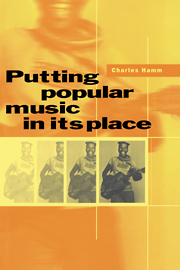Book contents
- Frontmatter
- Contents
- Acknowledgements
- Preface
- 1 Modernist narratives and popular music
- 2 Rock and the facts of life
- 3 Changing patterns in society and music: the US since World War II
- 4 “If I Were a Voice”: or, The Hutchinson Family and popular song as political and social protest
- 5 Some thoughts on the measurement of popularity in music
- 6 Elvis, a review
- 7 Home cooking and American soul in black South African popular music
- 8 Rock ‘n’ roll in a very strange society
- 9 African-American music, South Africa, and apartheid
- 10 “The constant companion of man”: Separate Development, Radio Bantu, and music
- 11 Privileging the moment of reception: music and radio in South Africa
- 12 Music and radio in the People's Republic of China
- 13 Towards a new reading of Gershwin
- 14 A blues for the ages
- 15 Graceland revisited
- 16 Dvořák in America: nationalism, racism, and national race
- 17 The last minstrel show?
- 18 The Role of Rock, a review
- 19 Genre, performance, and ideology in the early songs of Irving Berlin
- 20 Epilogue: John Cage revisited
- Index
6 - Elvis, a review
Published online by Cambridge University Press: 05 February 2012
- Frontmatter
- Contents
- Acknowledgements
- Preface
- 1 Modernist narratives and popular music
- 2 Rock and the facts of life
- 3 Changing patterns in society and music: the US since World War II
- 4 “If I Were a Voice”: or, The Hutchinson Family and popular song as political and social protest
- 5 Some thoughts on the measurement of popularity in music
- 6 Elvis, a review
- 7 Home cooking and American soul in black South African popular music
- 8 Rock ‘n’ roll in a very strange society
- 9 African-American music, South Africa, and apartheid
- 10 “The constant companion of man”: Separate Development, Radio Bantu, and music
- 11 Privileging the moment of reception: music and radio in South Africa
- 12 Music and radio in the People's Republic of China
- 13 Towards a new reading of Gershwin
- 14 A blues for the ages
- 15 Graceland revisited
- 16 Dvořák in America: nationalism, racism, and national race
- 17 The last minstrel show?
- 18 The Role of Rock, a review
- 19 Genre, performance, and ideology in the early songs of Irving Berlin
- 20 Epilogue: John Cage revisited
- Index
Summary
Though musicology had offered little intellectual guidance in my efforts to write about popular music and was under attack in the 1980s for its dedication to empirical, positivist scholarship, it nevertheless seemed that with its tradition of disciplined and responsible scholarship it should be able to deal effectively with popular music.
Albert Goldman's biography of Elvis Presley (New York, 1981), pieced together from facts, rumors, insinuations, and out-and-out fabrications, struck me as a particularly blatant instance of irresponsible and undisciplined writing about popular music. Even worse, there was no responsible or intellectually challenging biography of Presley or any other popular musician of the time against which to measure Goldman's misreadings of its protagonist and the culture from which he had come, and no satisfactory analysis or even description of the music itself against which to measure the distortions and outright absurdities of the book's frequent attempts to address musical issues.
Accordingly I wrote what was intended to be another call to action in the form of a review of Goldman's book, boldly accepted for publication in the Journal of the American Musicological Society by Ellen Rosand, editor-in-chief, and Edward Roesner, review editor. It was the first time that Presley, or for that matter rock ‘n’ roll itself, had been mentioned in that venerated journal. But the piece sparked no rush to welcome popular music into the musicological canon, and popular music study flourished elsewhere.
- Type
- Chapter
- Information
- Putting Popular Music in its Place , pp. 131 - 138Publisher: Cambridge University PressPrint publication year: 1995

